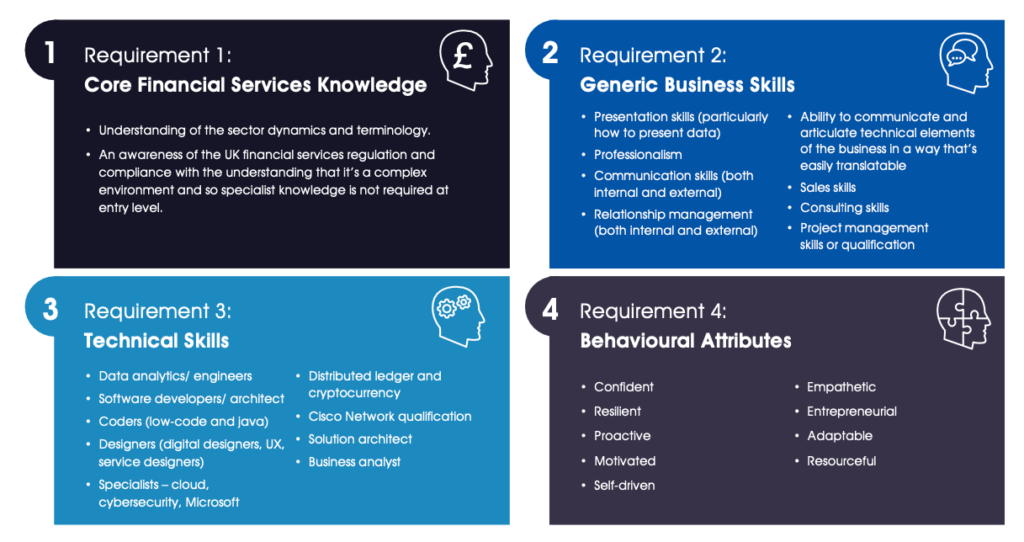The skills conundrum in FinTech
FinTech has transformed the landscape of financial services, driving efficiency, innovation, and new business models. However, the sector’s dynamism brings an inherent challenge—keeping pace with the evolving skill sets required by employers. Our FinTech Skills Framework report, commissioned by BMet, identified a profound skills shortage that threatens the sector’s sustainability and growth.
Our research pinpointed several critical deficiencies:
- Technological proficiency: Mastery of cutting-edge FinTech technologies is essential.
- Regulatory insight: Navigating the complex regulatory environment remains a significant hurdle.
- Innovative thinking: The ability to apply innovative solutions to real-world problems is in high demand.
These findings not only highlighted the skills gap but also suggested actionable pathways for educational institutions to address this challenge.
From research to action: Shaping educational programs
Educational innovation in response to industry needs requires more than just curriculum development—it demands a nuanced understanding of the sector’s dynamics. Whitecap Consulting’s approach integrates deep sectoral insights with practical educational strategies, ensuring recommendations are both relevant and impactful.
In the report, we identified four key FinTech Skills requirements for the current and future growth of competitiveness of the West Midlands FinTech sector alongside a recommended skills provision framework.

Designing for impact: The BMet FinTech Short Course
The BMet FinTech short course, which BMet believes to be the first FE-led program of its kind in the UK, exemplifies how consultancy-driven insights can translate into actionable educational initiatives. The course’s design reflects the key competencies identified in the FinTech Skills Framework, offering a hybrid learning model that blends self-study, online, and in-college learning.
Key elements of the course include:
- Comprehensive coverage: A solid foundation in FinTech concepts and technologies, aligned with industry requirements.
- Regulatory mastery: Training in navigating and understanding the regulatory environment.
- Practical engagement: Opportunities for students to interact with industry experts, bridging the gap between theory and practice.
- Career advancement: A focus on developing skills that are immediately applicable and recognized by employers, enhancing career progression.
Collaborative development: Engaging stakeholders
The development of this course was not an isolated effort; it involved close collaboration with key regional stakeholders, including the West Midlands Combined Authority (WMCA) and SuperTech, the UK’s only tech supercluster. This partnership underscores a critical aspect of educational innovation—engaging with industry and regional bodies to ensure the curriculum meets both current and future demands.
Suzie Branch-Haddow, Vice Principal for External Development at BMet, captured the essence of this collaborative effort:
“We know this region is already a major centre for FinTech with huge potential for this critical growth sector. There is a big role for FE to play in empowering our diverse talent pool to take advantage of the exciting opportunities in Birmingham and the West Midlands.”
Jo Griffin, Project and Skills Lead at SuperTech, will be one of the specialist lecturers on the course. Last year, SuperTech’s Impact Report found the estimated annual economic output from the sector in the West Midlands was £474M with FinTech productivity almost twice the regional average per worker.
Driving Economic Growth through education
The implications of this approach extend beyond the classroom. By addressing the FinTech skills gap, we are directly contributing to the region’s economic growth. The West Midlands, with its burgeoning FinTech sector, stands to benefit significantly from a workforce equipped with the skills required to drive innovation and productivity.
Hilary Smyth-Allen, Executive Lead for SuperTech, emphasised this point:
“I’m thrilled to see this innovative course open its doors for recruitment.
“The FE Blueprint cemented the status of FinTech in the region as one of the fastest growing tech sectors, but also one that has a significant skills shortage with a specific market gap in our sector. Unsurprisingly, the sector competes for these high value skills among the UK’s major growth sectors, but FE presents an untapped talent pipeline.”
Students who complete the programme will be awarded with a certificate. Employers in the SuperTech community and beyond will recognise the high value of the course. It will give a significant skills boost to participants and form an important element in their Continuous Professional Development (CPD).
Development of the programme has been supported by the WMCA.
David Gaughan, Head of Employer Services at the WMCA, said:
“We are delighted to back this fantastic new FinTech course at BMet which, along with FE partners across the region, plays such a crucial role in our skills system.”
“The business, professional and financial services cluster is set to see significant growth over the next decade, and we’re delighted that the WMCA focus in developing new skills pathways in key growth clusters has resulted in the development of this new FinTech offer to support our residents and employers.”
The path forward
The journey from identifying a skills gap to launching an educational program is a testament to the power of consultancy-driven innovation. As we continue to face evolving challenges in all sectors such as the FinTech sector, educational institutions, industry leaders, and consultancies must collaborate to develop programs that address current skills gaps and anticipate future needs.
For more insights on how consultancy can transform educational offerings and support sectoral growth, connect with Lal Tawney our education practice lead at Whitecap Consulting or explore the details of the FinTech short course by visiting the course page or contacting Suzie Branch-Haddow at [email protected].